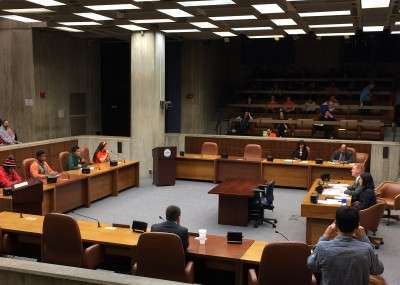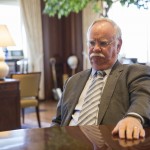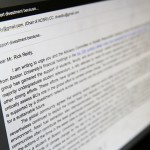
Boston City Council convened Monday evening at City Hall for a hearing regarding fossil fuel divestment for City of Boston Funds, where City Councilors and Boston residents examined the potential effects of fossil fuel divestment and determined that divesting from fossil fuels could have a major impact on the City’s economy.
City Councilors Matt O’Malley, chairman of the City Council’s Environment & Parks Committee and Ways & Means, and Michelle Wu presided over the hearing. Panelists and residents looked at the current investment portfolio for Boston’s pension fund, the possibility of the Boston Retirement Board to divest its holdings in fossil fuel companies and the creation of socially responsible investment criteria for City of Boston funds.
Divestment of fossil fuels might not be a suitable way to achieve a cleaner environment due to its significant cost and the issue of the City’s entanglement in a $4.5 trillion industry of loyal gas companies, said John Kelly, investment analyst for the Boston Retirement Board.
“The portfolio was comprised of nine separate accounts and 18 funds,” he said. “Our intention would be not to divest, but if there were Massachusetts regulations requirement, we would comply as we have been with previous divestment regulations.”
City Councilor Josh Zakim argued that the “one-time transactional cost” is not enough reason to not divest from fossil fuels.
Fossil fuel divestment of City funds refers to the withdrawal of the City’s investments in fossil fuels, to be invested elsewhere.
Representatives from the Boston Student Advisory Council, an organization of student leaders made up predominantly of Boston Public School students, and 350 Massachusetts, a Better Future Project statewide climate action advocacy group, as well as Boston residents were present at the hearing.
Eli Gerzon, state divestment organizer of Better Future Project, said divestment campaigns had been led by young people, people of color and low-income communities that have suffered from fossil fuels.
“Divestment is a growing movement to change what is politically possible,” he said. “Let’s be the first city and state to fully divest. This is the greatest justice issue of our time.”
During the public testimonials, Kerry Brock, a senior from Newton North High School and a member of the Better Future Project, said the City of Boston should fundamentally alter its reliance on fossil fuels.
“Divesting means rejecting fossil fuels at any cost including the cost of our future, our frontline communities and any possibility of justice,” Brock said.
Debra Jakes, a senior at the Boston Latin School and member of The Food Project, said having a sustainable food system means having a healthier future and fossil fuels are threatening that future.
“People depend on agriculture and it depends on a healthy climate and fossil fuels destroying our chances at that feature,” Jakes said.
The Food Project is an agricultural program focused on engaging young people in social change by immersing teenagers in leadership roles.
Sophie Hadingham, 24, of Jamaica Plan, said this is a priority for her because she works with young people and supports their beliefs and efforts toward achieving their goals.
“I see this as the number one crisis that we’re facing, and the fact that the 90 fossil fuel companies have created two-thirds of this problem means there’s a very specific enemy you can pin point,” she said. “So there’s a villain in this story and it’s up to us that they no longer profit from our planet.”
Nathan Tran-Trinh, 17, of West Roxbury, who came to the panel with Boston Student Advisory Council, said he and the others from the advisory council have put time and effort into the divestment effort.
“Over the summer, we did a lot of work regarding like divestments and the nature of the environment right now,” he said. “We also went to a couple of public meetings and lectures, and we went to a lot of rallies. Through all the lectures, we keep getting the same statistic and message, which is if we don’t divest, then eventually the environment will be ruined.”
Zack Gebhardt, 24, of Dorchester, said Boston should be leaders of climate change preparation, especially considering the opportunity the city has with its divestment funds.
“I’m pro-divesting because it’s a question of inevitability. There will be a time when these practices will not be allowed so why not be ahead of the curve,” he said. “The problem is that people need energy to live their lifestyles, and energy has to come from some source. The question of divestment is just transitioning from one source of energy to another.”














